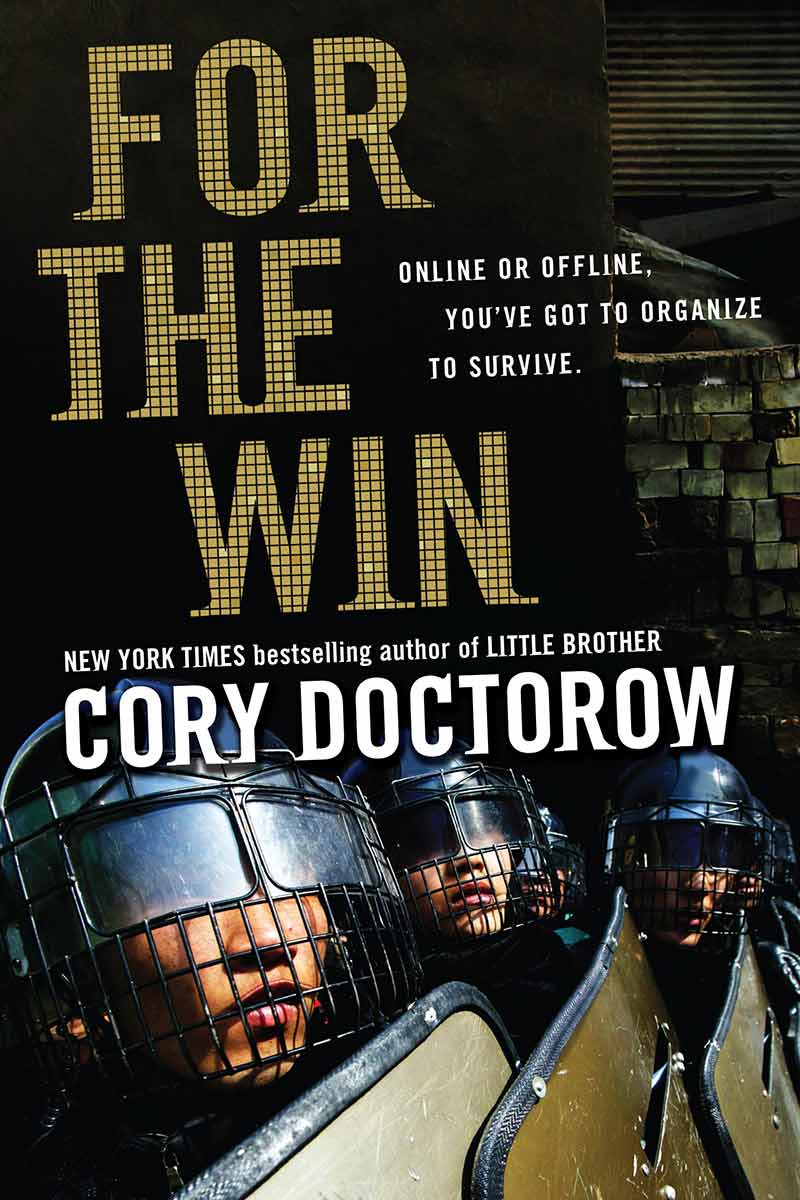“For the Win” is not a perfect book — merely a glorious one. Its end is open, almost ambiguous. It asks more questions than it answers. It stirs up trouble in its readers’ hearts and worries in our minds, presenting problems without providing forever-and-all-time solutions. But it dares much, and daring is the best way humans have of making progress.
All About:
Reviews
About Reviews Buy Download e-book Audiobook Donate a copy Remixes
The Guardian
It’s the near future and online labour is globalised: millions work in virtual sweatshops with no rights and no union representation. Gamers Matthew from China, and Mumbai slum-dwellers Mala and Yasmin, among others, labour online to amass millions for exploitative global corporations, until they realise that by overcoming their differences and working together they can defeat their oppressors. Doctorow isn’t afraid of taking on big ideas and difficult themes. Here he mixes online gaming, trades union politics and economics in a realistic near-contemporary setting. In lesser hands, this might make for a dull read, but Doctorow is a fine stylist. In For the Win he has produced an exhilarating, unputdownable novel that’s likely to be nominated for the genre’s top awards.
PopMatters
Doctorow keeps up a driving pace, full of action and violence both inside the games and in the real world as the union efforts heat up. With the popularity of online gaming today, it’s certainly easy to believe that the stakes are high for the players and companies, as well as the workers. Access to information, net neutrality, and fair use of the work of others are all issues that come into play in For the Win, set in the game context and mixed up with a global labor movement. It just might be that the author is describing a not-so-distant future.
Cory Doctorow has a way of tackling complicated subjects, such as economics and workers’ rights, in a really honestly, cool format. Video games are something that most teenagers are at least passably familiar with and so they make more sense than abstract explanations. And it’s fantastically well-written—there’s that, too.
The cover was clean, vivid, dynamic, and interesting. It’s not one of the most intriguing covers I’ve ever seen, but it definitely suits the story and doesn’t distract from it. Doctorow, from time to time, inserts brief lessons in game play and economics into his narrative—little asides that explain things a bit more. These manage to be educational without being patronizing, which is a tenuous balance in YA fiction. That, to me, was the most impressive part of the book.
Even if he writes only YA books his entire career, I’ll read whatever Cory Doctorow publishes. After Little Brother , I was very impressed. For the Win just cements my respect for him, both as a writer and as a man with a message.
Booklist review
Doctorow is indispensable. It’s hard to imagine any other author taking on youth and technology with such passion, intelligence, and understanding.
Once again Doctorow has taken denigrated youth behavior (this time, gaming) and recast it into something heroic. He can’t resist occasional lecture—sometimes breaking away from the plot to do so—but thankfully his lessons are riveting. With its eye-opening humanity and revolutionary zeal, this ambitious epic is well worth the considerable challenge.
Kotaku Review
Forget Doctorow’s outspoken politics, this guy can tell a story. The pacing keeps things moving, and for a book about unions (and virtual unions at that!), it zips by page after page. What really makes the book work is that so much of the action is externalized in the real world. They don’t just battle with keyboards, but with their fists. The stakes are high, and there is so much more to win and lose — it’s not just video game lives they are fighting for, but their very own existence! And since they are fighting against such brutal conditions, organizing and striking can cost them not just their livelihoods, but their lives. There are the occasional sidetracks Doctorow takes to explain things like gold farming, virtual economics and even inflation and deflation. While interesting, these were not my favorite parts of the book. I kept wanting to get back to the story and the characters.




























